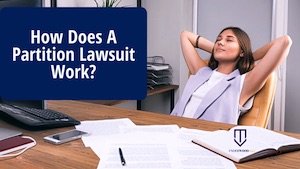
This article provides insight into how the partition process works so that you can know what to expect and hopefully navigate the process more smoothly. The typical steps for a partition lawsuit are described below.
Sometimes, when you inherit real estate together with another family member, or you buy an investment with a partner, the relationship deteriorates, and the parties cannot agree on what to do with the property. When you reach that situation, then a partition lawsuit is something you should consider.
The Partition Lawsuit Steps
Generally, the first step in the partition lawsuit process is the filing of a complaint in the county where the property is located. There are several requirements for the partition complaint, including identifying the ownership interests of those involved.
In any lawsuit for a partition action, the person who brings the lawsuit should identify the interests of those involved and identify the basis for their right to bring the lawsuit.
Then, although less common, a partition action may require the court to determine the title to the property for all of those involved, as well as the status and priority of all liens on the property. This is because an initial question is whether the Plaintiff, the person who brings the lawsuit, has a right to partition in the first place.
Third, if the court determines that a question as to title ownership exists, then a court may appoint a partition referee to review the status of the title and submit a report. The referee’s report, however, is simply that, and a court may or may not submit such issues to a jury. (Lorenz v. Jacobs (1881) 59 Cal. 262.)
Fourth, if the court determines that the person who brought the lawsuit has a right to partition, then the court will make a formal finding of the ownership interests in what is known as an interlocutory judgment. (CCP § 872.720(a).)
Fifth, after the court makes an ownership determination, the court will determine how the property should be partitioned, such as partition by private sale or partition by division.
Sixth, after the court determines the manner of partition, the court will refer the partition itself to a referee to partition the property either by selling it or dividing it.
Seventh, once the property is partitioned, the court will make an accounting of each party’s contributions to the property and make an adjustment according to their contributions.
Eighth, after the court determines each party’s contributions and adjusts the proceeds accordingly, the court will distribute the proceeds to the parties.
Conclusion
If you are faced with a joint ownership problem, contact Underwood Law Firm, P.C., to discuss your options.
Go here to get more details.
 California Partition Law Blog
California Partition Law Blog

